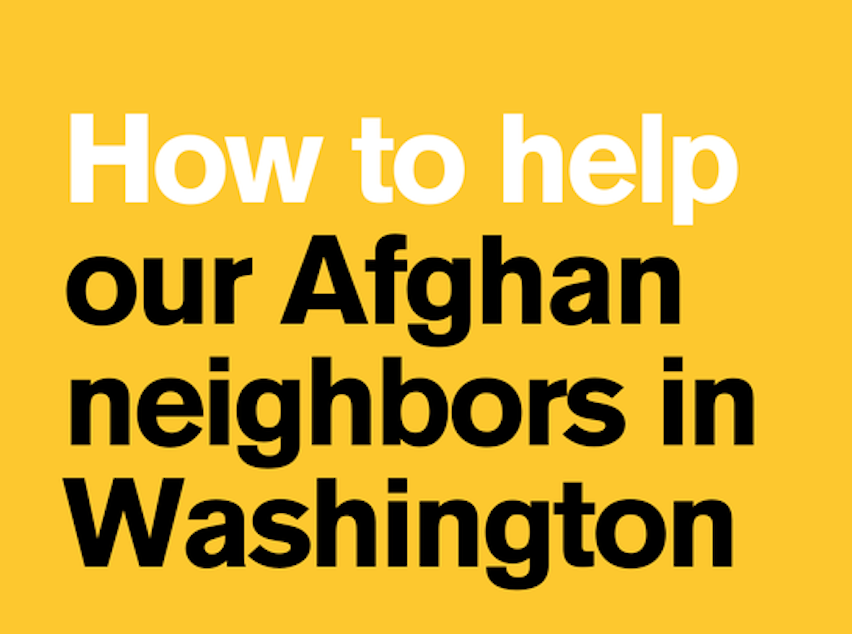'They need a sense of community': Local efforts to resettle Afghan refugees face unprecedented challenges

Even before today's deadly bombing in Kabul, the pictures coming out of Afghanistan have been heartbreaking: Thousands of people, families with young children, putting themselves at risk as they try to get onto flights out of Kabul to safety.
The International Rescue Committee here in Washington state has resettled 40 Afghans over the last three weeks, with many more to come. IRC Washington Executive Director Nicky Smith has been working with refugees for nearly 30 years. She told KUOW’s Kim Malcolm that what's happening now is unprecedented.
This interview has been edited for clarity.
Nicky Smith: The families that are arriving are deeply traumatized. Far, far more so than I've ever witnessed. They have had to leave their families very quickly. They know that their families are in harm's way. People are deeply frightened just getting to the airport.
Kim Malcolm: From your perspective, what are the biggest challenges ahead as they settle here?
The challenges are always large for refugee resettlement. It's a huge thing for you to leave your family behind and restart in a new country with a new language, a new culture. That's always deeply challenging.
I've been in the executive director position for five-and-a-half years. We've never had such an issue as we have right now with the availability of housing. So what does this mean for refugee resettlement? They're coming into Washington state, which is a deeply welcoming state to refugees, but now the warmth of the welcome is being dissipated because of the lack of permanent housing. This is a huge hurdle to overcome. We have to have people in temporary housing now, which is both costly and really is a setback for their ability to rebuild their lives in the United States.
What does that temporary housing look like?
International Rescue Committee has a tremendous partnership with Airbnb. We couldn't do the work without that partnership, but right now there is not enough. We're having conversations with other hotel groups to see if we can put them in temporary housing in hotels. But the problem with the temporary housing situation is that we need to get kids enrolled in schools. We need people to start getting jobs. It's really difficult to do that when you're in temporary housing. We really need to get people into permanent housing as quickly as possible.
There's also the financial support that people need. Not everyone who arrives here with your group is going to be eligible for public benefits right away. Explain that for us.
This is a brand new thing for us. We're having to learn this as it unrolls. We have two groups: One is eligible for all sorts of support from the federal government, and the other is not. Yet they have both gone through the same journey, the difference is simply bureaucracy. One has had their bureaucratic process completed, and the other has not.
As a resettlement agency, we're being told that this particular group cannot be enrolled for food stamps. Their children cannot be eligible for some of the programs that we run with federal funds for school support, or for health support, or even refugee resettlement itself. We're working really hard with the federal government to ensure that can be changed. We need to have a temporary fix while we work on the legislative aspects with the policy makers.
What is needed right now by your organization, and what's not needed?
What's needed is always money. We can give cash directly to families. They can then have their own agency, their own choice. It gives a sense of normalcy for the family. Cash donations are always wonderful.
We need gift cards, furniture. We would rather have gift cards for furniture stores, or gently used donated items so that we can minimize the operational costs around this.
We have such a huge need for volunteers and language skills. One of the things that we've noted is the typical language lines that we're using are under maximum pressure.
And what do these families need months and years from now, when the daily news coverage dies down?
They need a sense of community. They need work. They need stable housing. They need that sense of safety that has been missing from their lives, not just in the past weeks, but years. This is one of the reasons why they had to come to the United States: Because they were targeted.
What's being said in the media by the Taliban is not what's playing out in reality. Houses are being searched for links to America. So it’s not just the newly arrived people. Individuals and families that have been here for a while now are constantly contacting us asking, “How do I get my loved ones out? How can they come into the United States?”
One of the things that we really also need is a better pathway for Afghans to come into the United States, rather than just the process that's in place right now, that is incredibly restrictive and impossible to manage.
Listen to the interview by clicking the play button above.





